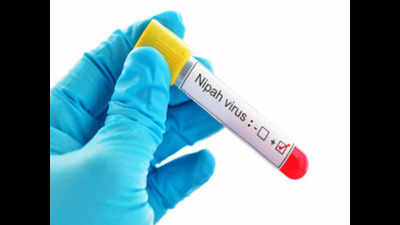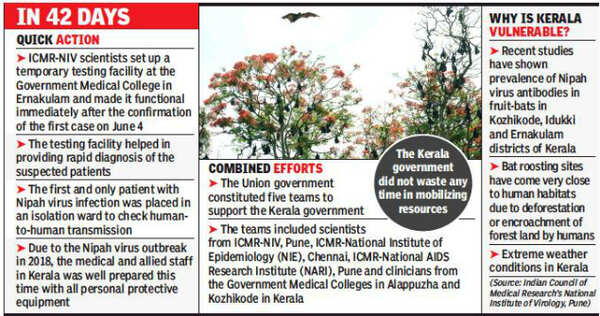Trending
This story is from July 17, 2019
NIV scientists put Nipah virus fear to rest, declare Kerala threat-free
People who abandoned their plans to visit Ernakulam in Kerala following Nipah virus scare can visit the place without any worry as scientists at the National Institute of Virology (NIV) have declared the tourist destination threat-free

Picture used for representational purpose only
PUNE: People who abandoned their plans to visit Ernakulam in Kerala following Nipah virus scare can visit the place without any worry as scientists at the National Institute of Virology (NIV) have declared the tourist destination threat-free.

A 21-year-old man had tested positive for Nipah virus in Ernakulam on June 4. However, quick onsite rapid diagnostic facility, coordinated efforts of the state health machinery and NIV scientists reined in the virus, while preventing its human-to-human transmission.Last year, the virus had claimed 17 lives in an outbreak in Kerala’s Kozikode district.
“We can only say that the present outbreak is contained as no secondary cases have been reported so far,” senior scientist Raman R Gangakhedkar, head (epidemiology and communicable diseases), Indian Council of Medical Research (ICMR), told TOI.
ICMR-NIV is the only premier virology laboratory in India to test and confirm the presence of Nipah virus. “It has been more than 10 years now that our scientists have been working on developing indigenous tests and reagents for Nipah virus testing as well as standardizing the technology in trapping the fruit bats that carry the virus. This investment has helped,” senior scientist D T Mourya, former director of ICMR-NIV, said.
Starting a temporary rapid diagnostic facility in Ernakulam proved a game changer in containing the virus. “Since we had the reagents and expertise available with us, we could set up a temporary testing centre for quick diagnosis on site,” NIV scientist Pragya Yadav said.
NIV has also trained its scientific and technical staff in trapping of bats, necropsy (an autopsy performed on an animal) and sample collection. “This expertise came handy to determine the association of bats in virus transmission,” NIV scientist M D Gokhale said.
Compared with the virus outbreak in 2018, there was less panic after a virus re-emerged this year. “There are several reasons for this. The first man who tested positive for the virus on June 4 recovered from the severe illness and brain inflammation. Barring this, there were no fresh cases,” NIV senior scientist AB Sudeep said.
Experts at NIV, including virologists Pragya Yadav, Rima Sahay, Anita Shete and ICMR senior scientist Nivedita Gupta, made major contributions to the Nipah virus investigations. “Ever since the agent for the outbreak was confirmed by the Bio-Safety Level 4 (BSL-4) laboratory at NIV on June 4, the whole unit worked day in and day out in shifts, including Sundays,” Yadav said.

A 21-year-old man had tested positive for Nipah virus in Ernakulam on June 4. However, quick onsite rapid diagnostic facility, coordinated efforts of the state health machinery and NIV scientists reined in the virus, while preventing its human-to-human transmission.Last year, the virus had claimed 17 lives in an outbreak in Kerala’s Kozikode district.
“We can only say that the present outbreak is contained as no secondary cases have been reported so far,” senior scientist Raman R Gangakhedkar, head (epidemiology and communicable diseases), Indian Council of Medical Research (ICMR), told TOI.
The incubation period of the Nipah virus is 21 days. “It is already over 42 days, which means double the incubation period has passed. Hence, we can safely declare that the present outbreak is over,” Gangakhedkar said.
ICMR-NIV is the only premier virology laboratory in India to test and confirm the presence of Nipah virus. “It has been more than 10 years now that our scientists have been working on developing indigenous tests and reagents for Nipah virus testing as well as standardizing the technology in trapping the fruit bats that carry the virus. This investment has helped,” senior scientist D T Mourya, former director of ICMR-NIV, said.
Starting a temporary rapid diagnostic facility in Ernakulam proved a game changer in containing the virus. “Since we had the reagents and expertise available with us, we could set up a temporary testing centre for quick diagnosis on site,” NIV scientist Pragya Yadav said.
NIV has also trained its scientific and technical staff in trapping of bats, necropsy (an autopsy performed on an animal) and sample collection. “This expertise came handy to determine the association of bats in virus transmission,” NIV scientist M D Gokhale said.
Compared with the virus outbreak in 2018, there was less panic after a virus re-emerged this year. “There are several reasons for this. The first man who tested positive for the virus on June 4 recovered from the severe illness and brain inflammation. Barring this, there were no fresh cases,” NIV senior scientist AB Sudeep said.
Experts at NIV, including virologists Pragya Yadav, Rima Sahay, Anita Shete and ICMR senior scientist Nivedita Gupta, made major contributions to the Nipah virus investigations. “Ever since the agent for the outbreak was confirmed by the Bio-Safety Level 4 (BSL-4) laboratory at NIV on June 4, the whole unit worked day in and day out in shifts, including Sundays,” Yadav said.
End of Article
FOLLOW US ON SOCIAL MEDIA










